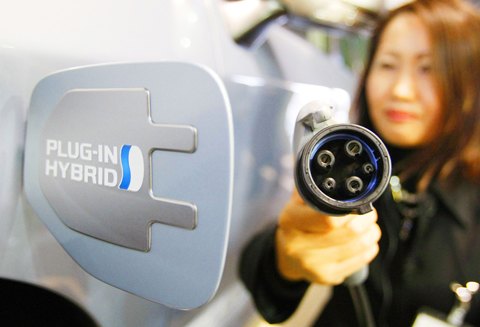Toyota showed its new plug-in hybrid yesterday, available for leasing this month in Japan, the US and Europe and promised the green vehicle for sale to regular consumers by 2011 at an “affordable” price.
The plug-in Prius is the first from Toyota Motor Corp packed with a more powerful battery called lithium-ion, which is different from the batteries used in Prius hybrids on roads today.
A plug-in is even friendlier to the environment than the regular Prius because it travels longer as an electric vehicle.

PHOTO: REUTERS
Toyota leads rivals in hybrids, especially in Japan, where government incentives have made the Prius a top-seller for months.
About 600 of the vehicles will be introduced in Japan, the US and Europe — 230 in Japan, 150 in the US and 200 in Europe — over the first half of next year starting this month, the company said.
The customers are businesses and governments. One hundred are going to the city of Strasbourg, France.
Toyota’s plug-in travels 23.4km as an electric vehicle on a single charge and gets 57km a liter in mileage.
When the charge runs out, a plug-in starts running like a regular hybrid, ensuring drivers won’t run out of power on the road.
In a demonstration for reporters at a Toyota showroom, the Prius plug-in quietly glided through a small, winding course even when the driver pushed moderately on the gas pedal to reach close to 60kph. The car can reach up to 100kph.
The gasoline engine part of the hybrid kicks in only when the battery runs out, or if the driver pushes too hard on the gas pedal for acceleration, according to Toyota.
The plug-in recharges from a regular household socket in two hours.
Toyota tests for a plug-in prototype found half the people traveled less than 25km a day.
Toyota declined to give a leasing price, saying that it was being set with customers but acknowledged it was not going to make any money from the leasing.
Executive vice president Takeshi Uchiyamada said he could not give an estimate for the vehicle’s price when it goes on sale in 2011, because details were still undecided and consumer demand was hard to predict.
“I can only say it will be a price that will have potential buyers seeing a plug-in as a viable option,” he said.
Uchiyamada said many hurdles remain for electric vehicles to become widespread, including limited cruising range and cost for the battery, making a plug-in still the best practical option.
He said Toyota was waiting until 2011 before commercial sales to gain feedback from users during the leasing period.
“We have been working on developing efficient powertrains to be able to use oil as efficiently as possible,” he said. “But many hurdles remain for alternative fuels.”

Authorities have detained three former Taiwan Semiconductor Manufacturing Co (TMSC, 台積電) employees on suspicion of compromising classified technology used in making 2-nanometer chips, the Taiwan High Prosecutors’ Office said yesterday. Prosecutors are holding a former TSMC engineer surnamed Chen (陳) and two recently sacked TSMC engineers, including one person surnamed Wu (吳) in detention with restricted communication, following an investigation launched on July 25, a statement said. The announcement came a day after Nikkei Asia reported on the technology theft in an exclusive story, saying TSMC had fired two workers for contravening data rules on advanced chipmaking technology. Two-nanometer wafers are the most

NEW GEAR: On top of the new Tien Kung IV air defense missiles, the military is expected to place orders for a new combat vehicle next year for delivery in 2028 Mass production of Tien Kung IV (Sky Bow IV) missiles is expected to start next year, with plans to order 122 pods, the Ministry of National Defense’s (MND) latest list of regulated military material showed. The document said that the armed forces would obtain 46 pods of the air defense missiles next year and 76 pods the year after that. The Tien Kung IV is designed to intercept cruise missiles and ballistic missiles to an altitude of 70km, compared with the 60km maximum altitude achieved by the Missile Segment Enhancement variant of PAC-3 systems. A defense source said yesterday that the number of

A bipartisan group of US representatives have introduced a draft US-Taiwan Defense Innovation Partnership bill, aimed at accelerating defense technology collaboration between Taiwan and the US in response to ongoing aggression by the Chinese Communist Party (CCP). The bill was introduced by US representatives Zach Nunn and Jill Tokuda, with US House Select Committee on the Chinese Communist Party Chairman John Moolenaar and US Representative Ashley Hinson joining as original cosponsors, a news release issued by Tokuda’s office on Thursday said. The draft bill “directs the US Department of Defense to work directly with Taiwan’s Ministry of National Defense through their respective

Tsunami waves were possible in three areas of Kamchatka in Russia’s Far East, the Russian Ministry for Emergency Services said yesterday after a magnitude 7.0 earthquake hit the nearby Kuril Islands. “The expected wave heights are low, but you must still move away from the shore,” the ministry said on the Telegram messaging app, after the latest seismic activity in the area. However, the Pacific Tsunami Warning System in Hawaii said there was no tsunami warning after the quake. The Russian tsunami alert was later canceled. Overnight, the Krasheninnikov volcano in Kamchatka erupted for the first time in 600 years, Russia’s RIA